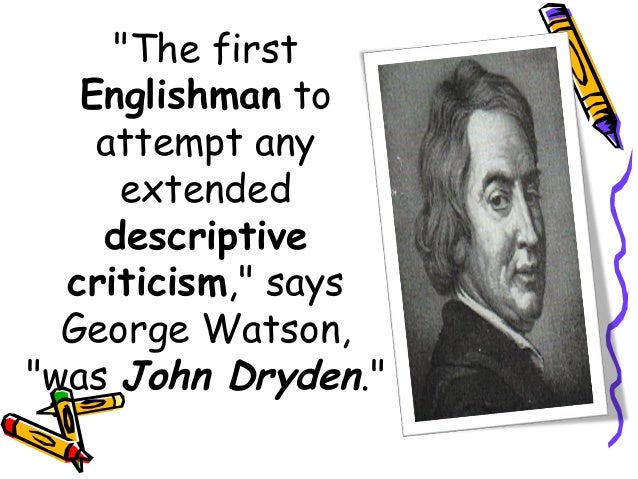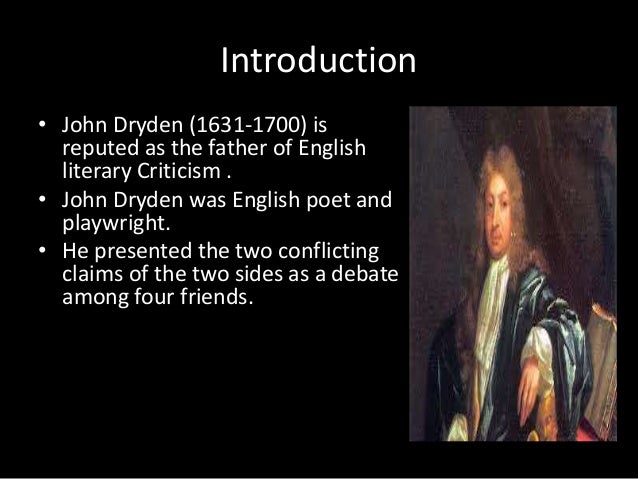I'm Reshma the Student of Department of English, MKBU. I am going to write on the given respective thinking task on Dryden's Essay on Dramatic Poesy.
DRYDEN'S ESSAY ON DRAMATIC POESY :
Q.1 Difference between Aristotle's definition of Tragedy and Dryden's definition of Play?
Response: Aristotle and John Dryden were both influential figures in the history of literature and drama, but they lived in different eras and had distinct perspectives on the nature of tragedy and drama. Let's explore the differences between Aristotle's definition of tragedy and Dryden's definition of play:
**Aristotle's Definition of Tragedy:**
Aristotle's ideas on tragedy are primarily outlined in his work "Poetics." According to Aristotle, a tragedy is a form of drama that adheres to specific principles:
1. **Catharsis:** Aristotle believed that the primary purpose of a tragedy was to arouse emotions of pity and fear in the audience and then to purify or cleanse these emotions through catharsis. This catharsis, he argued, would lead to emotional and moral growth in the spectators.
2. **Plot Structure:** Aristotle emphasized the importance of a well-structured plot. He introduced the idea of the "Three Unities," which include unity of time (the action should occur within a single day), unity of place (the action should take place in a single location), and unity of action (the plot should have a single, focused storyline).
3. **Tragic Hero:** A tragic hero, according to Aristotle, is a character of noble stature who experiences a reversal of fortune due to a tragic flaw (hamartia). This reversal leads to their downfall, and the audience should feel a sense of both pity and fear for the character.
**John Dryden's Definition of Play:**
John Dryden, an English poet, critic, and playwright from the 17th century, had a different approach to drama. His ideas were influenced by the changing theatrical practices of his time:
1. **Heroic Drama:** Dryden was a proponent of a type of drama called "heroic drama." He believed that drama should reflect the grandeur and elevated language of classical epics. In heroic drama, the characters often had heroic qualities and spoke in verse.
2. **Unity of Action and Verisimilitude:** While Aristotle emphasized unity of action, Dryden placed more importance on verisimilitude, or the appearance of truth. He argued that the events in a play should be believable and that the audience should be able to connect with the characters and situations presented on stage.
3. **Variety and Entertainment:** Dryden believed that drama should entertain and engage the audience. He was less concerned with strictly adhering to Aristotle's rules and was more open to experimentation and innovation in the theater.
- In summary, Aristotle's definition of tragedy focused on the emotional and moral impact of a well-structured plot and the catharsis it produces, while Dryden's definition of play, particularly in the context of heroic drama, emphasized the use of elevated language, verisimilitude, and the entertainment value of drama. These two definitions reflect the evolving nature of dramatic theory and practice over time.
Q.2 Topic related to Dryden as "Father of English criticism".
Q.2 Response: John Dryden's contributions to English literary criticism are indeed noteworthy, and several aspects of his work and ideas solidify his role as a significant figure in the development of English criticism. Here are some key topics related to John Dryden as a prominent figure in English criticism:
1. **Prefaces and Critical Essays:** Dryden wrote numerous critical essays and prefaces to his own works and the works of other writers. These writings often contained his thoughts on the principles of literature, poetry, and drama. His prefaces to his translations of Virgil's "Aeneid" and his "Essay of Dramatic Poesy" are particularly famous.
2. **Restoration Criticism:** Dryden lived during the Restoration period in English history, and his critical writings reflect the changing literary tastes and standards of the time. He played a significant role in shaping the literary norms and preferences of the late 17th century.
3. **Neoclassical Influence:** Dryden was influenced by neoclassical principles of literature, which stressed the importance of adhering to classical rules and structures in poetry and drama. His critical works often discuss the application of these principles to English literature.
4. **The Ancients vs. the Moderns:** Dryden engaged in the debate between the "Ancients" (classical writers) and the "Moderns" (contemporary writers). He defended the value and achievements of modern English literature and drama, asserting that they could stand up to the classics of antiquity.
5. **Verisimilitude and Realism:** Dryden explored the concept of verisimilitude (the appearance of truth) in literature, arguing that a work of fiction should strive for believability. This notion had a significant impact on the development of the English novel.
6. **Dramatic Structure:** In "An Essay of Dramatic Poesy," Dryden discussed the principles of dramatic structure, including the importance of unity of action and the role of rhyme in drama.
7. **Influence on Later Critics:** Dryden's critical ideas and writings influenced later literary critics, including Samuel Johnson and Alexander Pope. His emphasis on clarity, reason, and the importance of following established rules had a lasting impact on English literary criticism.
While John Dryden may not be exclusively known as "The Father of English Criticism," he made substantial contributions to the field of literary criticism in the context of his time. His ideas and writings played a crucial role in shaping the course of English literary criticism and aesthetics in the 17th and 18th centuries.
👍👍👍👍👍👍Thanks........







No comments:
Post a Comment